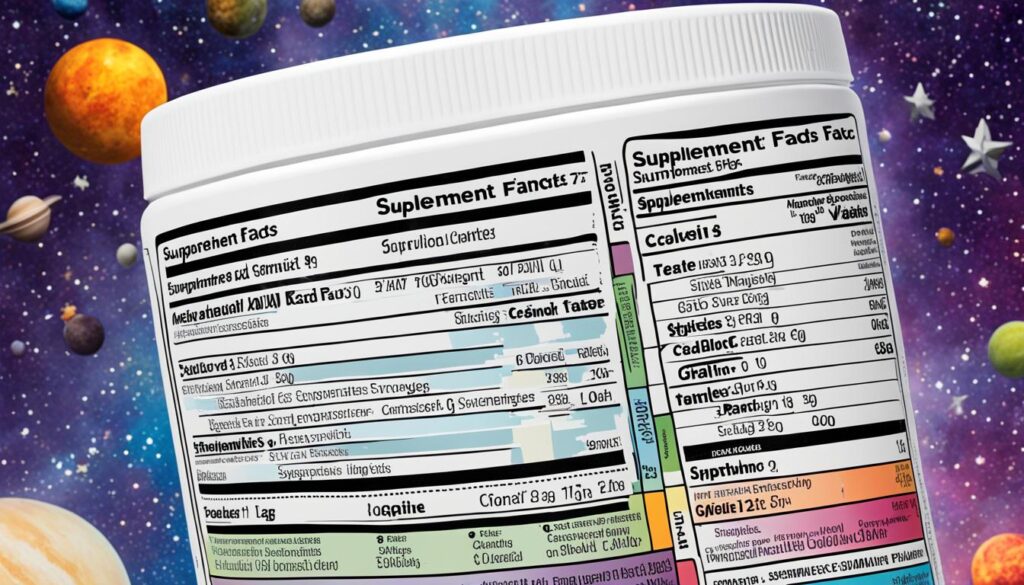Physical Address
304 North Cardinal St.
Dorchester Center, MA 02124
Physical Address
304 North Cardinal St.
Dorchester Center, MA 02124

From expert guidance on supplement efficacy and safety to understanding regulations and potential interactions, explore all you need to know about dietary supplements.
Many people in the United States, both adults and kids, take vitamins or dietary supplements. These supplements can have minerals, herbs, and more. They help get extra nutrition. These come as tablets, gummies, and powders.
Popular supplements include vitamins D and B12 and minerals like calcium and iron. Some use herbs like echinacea and garlic. Others like glucosamine, probiotics, and fish oils are also popular. It’s important to know, supplements are not medicine. They are not for treating sickness or preventing diseases.
Dietary supplements come with many ingredients. These can be vitamins, minerals, herbs, amino acids, and more. They might help with bone health, immune system, and heart health.
Vitamins like A, B, C, and minerals such as calcium and iron are in supplements. You can also get supplements from plants like echinacea. These include things needed for protein and enzyme functions as well.
You can find supplements in various forms like tablets, powders, and drinks. How you take them can change how well your body uses the nutrients. For people who can’t take pills, there are gummies and other options.
Many people use vitamins, iron, calcium, and herbs like echinacea and garlic. These, along with amino acids and probiotics, are well-known. They are said to help with many health areas. Still, scientists are studying how well they work.
When you buy dietary supplements, you’ll find a Supplement Facts label. This label shows the active ingredients and the amount per serving (dose). It also lists other ingredients like fillers and flavorings. The serving size might be different from what your doctor suggests. It’s key to know the Supplement Facts label to ensure you take the right amount and ingredients.
| Nutrient | 1 Serving (1 cup) | 2 Servings (2 cups) | % Daily Value (DV) |
|---|---|---|---|
| Calories | 280 | 560 | – |
| Total Fat | 9g | 18g | – |
| Saturated Fat | 4.5g | 9g | – |
| Trans Fat | 0g | 0g | – |
| Cholesterol | 35mg | 70mg | – |
| Sodium | 850mg | 1700mg | 37% |
| Total Carbohydrate | 34g | 68g | – |
| Dietary Fiber | 4g | 8g | – |
| Total Sugars | 6g | 12g | – |
| Added Sugars | 0g | 0g | – |
| Protein | 15g | 30g | – |
| Vitamin D | 0mcg | 0mcg | – |
| Calcium | 320mg | 640mg | – |
| Iron | 1.6mg | 3.2mg | – |
| Potassium | 510mg | 1020mg | – |
The Supplement Facts label is very helpful. It tells you about the active ingredients, serving size, and other ingredients in a supplement. This knowledge lets you choose what’s right for you, wisely.

Some dietary supplements can fill nutrient gaps in your diet. Yet, they’re no substitute for a healthy eating plan. They may boost overall health and help with certain conditions. For example, calcium and vitamin D benefit bone health. Folic acid lowers the risk of birth defects. And omega-3s from fish oils support heart health. However, we’re still learning about many other supplements’ effects.
Specific supplements can offer some help with health issues. A mix of vitamin C and E, zinc, copper, lutein, and zeaxanthin (AREDS formula) might slow vision loss in those with AMD. Calcium and vitamin D are good for bones. Omega-3s may aid heart disease. Still, the FDA doesn’t check if supplements really work before they’re sold.
Some dietary supplements are powerful and can lead to side effects. This is more likely when they are taken in large amounts or mixed with other supplements. They might not go well with some medicines too. For instance, taking both vitamin K and the blood thinner warfarin can decrease warfarin’s effects. St. John’s wort can make some drugs less effective, and antioxidants like vitamins C and E could also make certain chemotherapy less helpful.
Using too many supplements can be bad for your health and wallet. Overdoing vitamin A might lead to headaches and birth defects. Too much iron could damage your liver. If you’re expecting, nursing, or giving supplements to a kid, you should be extra careful. Many supplements haven’t been thoroughly checked for safety in these cases.
Extra care is needed for pregnant women, nursing mothers, and children taking supplements. It’s wise for these groups to avoid supplements other than what’s in a standard prenatal doses. Always consult a doctor before giving kids any supplements. Many supplements don’t have enough safety data for children yet.
If you’re pregnant, nursing, or your children need supplements, be cautious. Discuss with your doctor about the side effects and possible mix-ups with other drugs. Follow their dosage advice closely for the best safety outcomes.

The U.S. Food and Drug Administration (FDA) set up standards for companies. These Good Manufacturing Practices (GMPs) aim to guarantee the supplement quality, identity, purity, and strength. They make sure the right ingredients are used correctly in supplements. This helps avoid using wrong ingredients too much or too little, and it lowers the risk of supplement contamination and wrong packaging.
The FDA checks on supplement-making sites to make sure they follow these rules. This is to make sure supplements are safe and made correctly.
Companies making supplements must stick to the FDA’s Good Manufacturing Practices (GMPs) to keep up high supplement quality. These rules ensure supplements are what they say they are, are pure, strong, and made as they should be. This helps prevent any chance of them being dirty or wrongly labeled.
Independent groups like ConsumerLab.com, NSF International, and U.S. Pharmacopeia test supplements to check if they’re good. If a product passes, they get a seal of approval. This seal shows the product is made well, has the right stuff in it, and not too much dirt. But, remember, even with these seals, a supplement might not be safe or work as expected.
It’s key to share with your healthcare team about any dietary supplements you use. This includes doctors, dentists, and pharmacists. They can tell you which supplements might help you. They will advise you on the right usage and dosage.
Make a list of all the dietary supplements and medicines you use. The Office of Dietary Supplements site has a form, “My Dietary Supplement and Medicine Record,” you can use. Fill it in with the product name, dose, how often you take it, and why. Your healthcare team will find this list useful for planning your overall health.

Dietary supplements and medicines have different rules. Medicines must get FDA approval before selling. Supplements do not need this approval. Supplement companies should show their products are safe. They must prove their label claims are true and not misleading. But, if a supplement has an ingredient introduced since October 15, 1994, it doesn’t need to prove its safety to the FDA before being sold.
Unsafe or misleading dietary supplements can be banned by the FDA. The FTC also fights false advertisements. It ensures that manufacturers follow the FDA’s Current Good Manufacturing Practices (cGMPs). This is to keep quality in making, packaging, and labeling supplements.
Supplement labels can claim to help with health or specific body functions, like heart health or immune system support. But, they must add, “This statement has not been evaluated by the Food and Drug Administration. This product is not intended to diagnose, treat, cure, or prevent any disease.” The FTC makes sure that all supplement information is true and not false.

The federal government provides many resources and trusted sources for information on dietary supplements. These include bodies like the National Institutes of Health (NIH) and the Office of Dietary Supplements (ODS). The National Center for Complementary and Integrative Health (NCCIH) and the Food and Drug Administration (FDA) are also key players.
These groups give the most current and solid scientific info on dietary supplements. They cover the benefits, risks, and the rules guiding their use.
The National Institutes of Health and the ODS have evidence-based details on supplements. They focus on things like vitamins, natural herbs, and even probiotics. Additionally, they provide resources for those looking into supplements for weight loss or athletic performance.
If you’re concerned about how drugs and supplements might not mix well, don’t worry. The HHS and the NIH’s National Center for Complementary and Integrative Health have tools for you. The HHS and FDA also have info to help you understand more about supplements’ safety.
For the armed forces and their families, the government is here to help, too. The NIH and the Department of Defense’s Operation Supplement Safety offer useful info. They help with smart choices when using supplements.
Dietary supplements can benefit your health. But, it’s key to use them wisely, with the help of healthcare experts. It’s vital to know about the different types, what they can offer, and the possible dangers. Being aware of this info is important.
Always check with professionals before adding supplements to your routine. They include doctors, dentists, pharmacists, and dietitians. They can suggest the right ones for you.
It’s crucial to look for supplements that are safe and of high quality. Third-party tests help confirm this. Plus, always follow the directions for how to use them. This keeps you safe and gets you the best results.
Remember, dietary supplements are not for everyone. They are not a replacement for a healthy diet. Working with experts and staying informed are the best ways to use them. If you do, they might support your wellness goals.